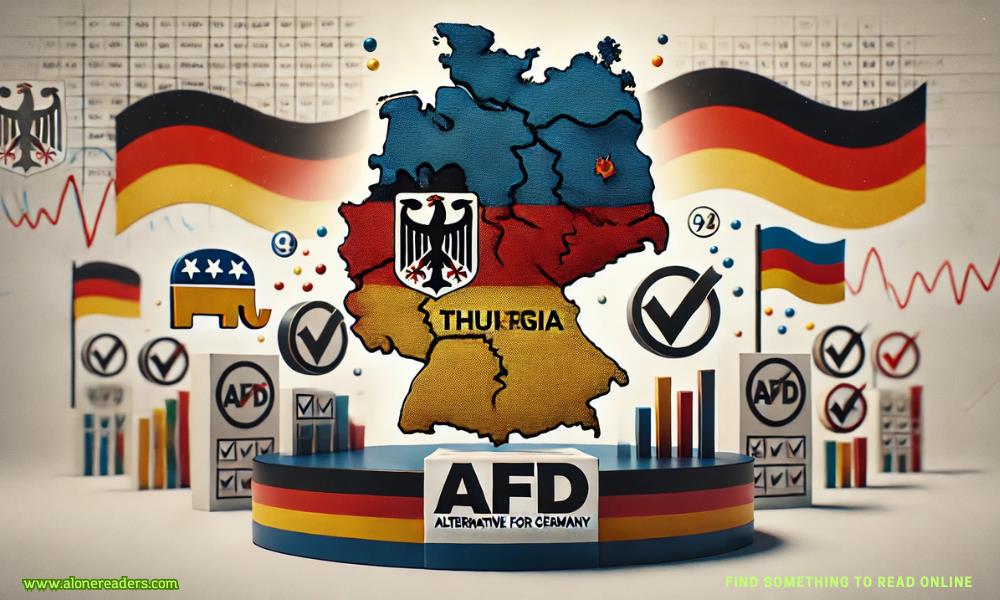
In a dramatic turn of events, the far-right Alternative for Germany (AfD) has secured a victory in Thuringia’s state election, marking the first time the party has won a state election in Germany. This victory is seen as a significant shift in German politics, reflecting growing discontent among voters in eastern Germany and increasing support for the AfD’s nationalist and anti-immigration platform.
The election results in Thuringia have shocked many across the country, as the AfD managed to outpace traditional parties like the Christian Democratic Union (CDU) and the Social Democratic Party (SPD). While the AfD has been gaining ground in local elections over recent years, this is the first time the party has won a majority in a state election, sparking concerns about the future of Germany’s political landscape.
Thuringia, a small state in eastern Germany, has long been considered a stronghold for left-wing parties like Die Linke (The Left), but recent shifts in public sentiment have led to a growing base of AfD supporters. The party's victory in this election is emblematic of broader political currents sweeping through the region, where the AfD has increasingly resonated with voters frustrated by Germany's handling of immigration, economic stagnation, and a perceived loss of national identity.
In the Thuringia election, the AfD secured over 30% of the vote, far ahead of its competitors. The CDU came in second place, while the SPD and Die Linke saw sharp declines in their voter bases. Many analysts believe the AfD’s strong showing in Thuringia is a reflection of dissatisfaction with the status quo, as well as an endorsement of the party’s anti-establishment and anti-immigration stance.
AfD leader in Thuringia, Björn Höcke, a controversial figure known for his nationalist rhetoric, celebrated the win as a turning point for the party. “This is a victory for the people of Thuringia and for all Germans who want to reclaim their country,” Höcke declared in his victory speech. His leadership has been pivotal in the party's strategy of appealing to regional grievances, particularly in areas that feel left behind by Germany’s economic success.
The AfD’s victory in Thuringia has raised alarms within the German political establishment. Mainstream parties like the CDU and SPD have already expressed concern about the rise of the far-right, and some have called for strategic coalitions to prevent the AfD from gaining further ground. However, the AfD’s victory in Thuringia may signal a growing fracture within German politics, particularly as voter sentiment continues to shift away from centrist policies.
This election win also highlights the deepening divide between eastern and western Germany. While western states remain largely resistant to the AfD’s message, eastern Germany has become a stronghold for the party, with many voters expressing frustration over what they see as a lack of attention from the federal government. The AfD’s victory in Thuringia could embolden the party to pursue more aggressive campaigns in other eastern states, where they have already gained a foothold.
Reaction to the AfD’s victory has been swift, with both domestic and international leaders weighing in on the results. German Chancellor Olaf Scholz expressed his concerns about the rise of the far-right, calling it a “dangerous development” for Germany’s democracy. “The AfD represents an ideology that threatens the values of tolerance, equality, and openness that our country stands for,” he said in a statement following the election.
Other European leaders have also voiced their unease. French President Emmanuel Macron warned that the AfD’s rise could inspire similar movements in other EU countries, while EU Commission President Ursula von der Leyen called for stronger efforts to combat far-right extremism across the continent.
However, AfD supporters view the win as a reflection of popular frustration with the current political order. Many voters in Thuringia cited concerns over immigration, national sovereignty, and economic inequality as key reasons for their support of the AfD. “We feel like our voices are finally being heard,” said one Thuringian voter, expressing a sentiment that has become increasingly common among the party’s base.
The AfD’s victory in Thuringia could be a harbinger of things to come for German politics, as the party positions itself for future state and national elections. While the party’s success in Thuringia is unprecedented, it remains to be seen whether they can replicate this result in other states or in the next federal election. The AfD will likely continue to focus on its core issues, such as immigration control, economic protectionism, and national identity, which have proven to resonate with a significant portion of the electorate.
However, the AfD’s rise also poses challenges for Germany’s political system. Mainstream parties may be forced to reconsider their strategies in order to counter the far-right, potentially leading to new alliances or shifts in policy. Some analysts have suggested that a more unified approach among centrist parties could be the best way to contain the AfD’s influence, though this may require difficult compromises.
Conclusion: A Pivotal Moment for Germany
The AfD’s victory in Thuringia marks a pivotal moment for German politics. As the party continues to gain support, both in eastern Germany and beyond, the implications for the country’s future are profound. With the AfD now holding significant power in Thuringia, the party is likely to push for policy changes that reflect its nationalist agenda, potentially sparking further divisions within German society.
As Germany prepares for upcoming elections, the success of the AfD in Thuringia will undoubtedly shape the national conversation around immigration, economic inequality, and national identity. Whether the party’s rise will be a temporary surge or a lasting force in German politics remains to be seen, but one thing is clear: the AfD is now a major player in the country’s political landscape.